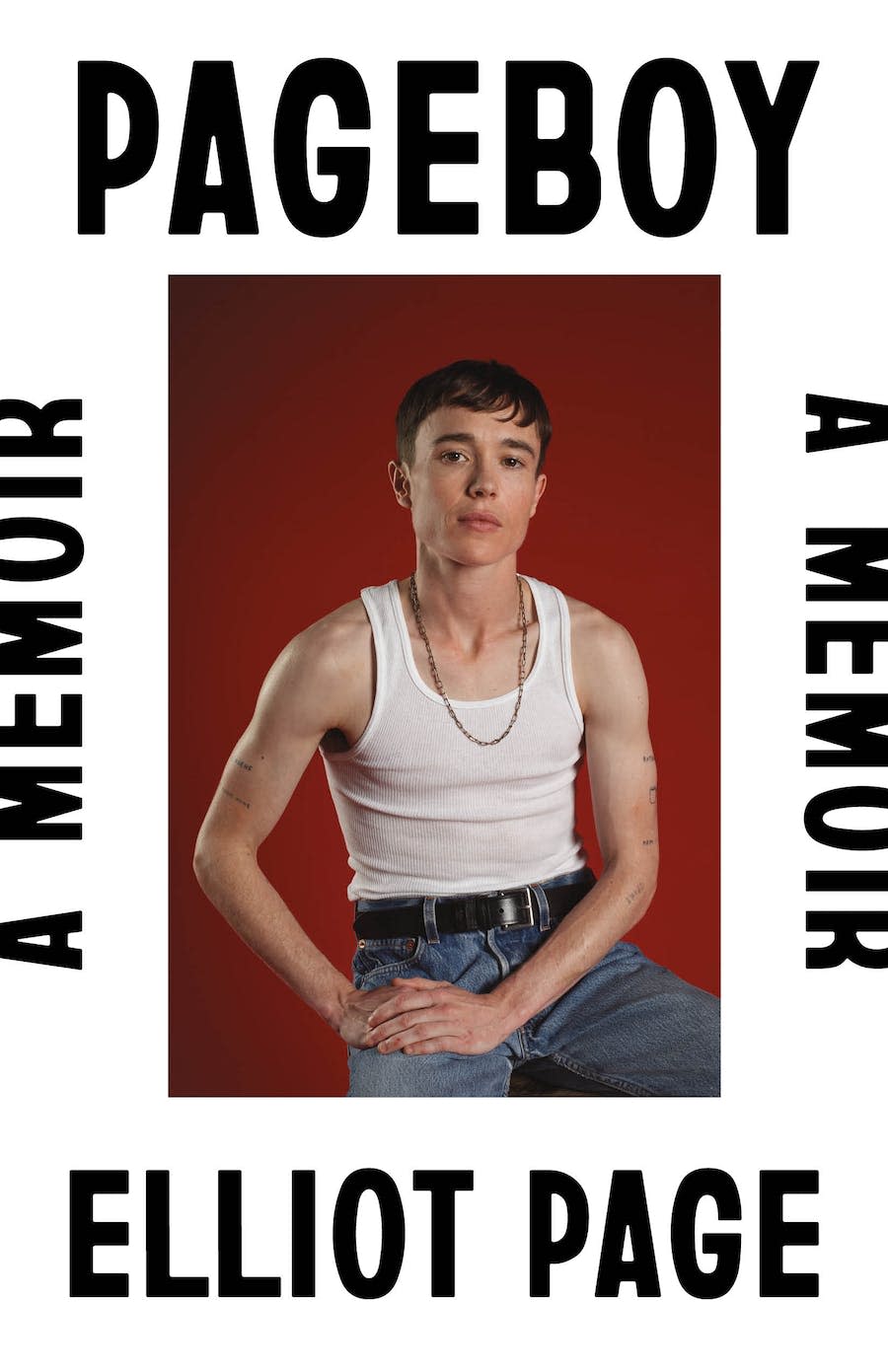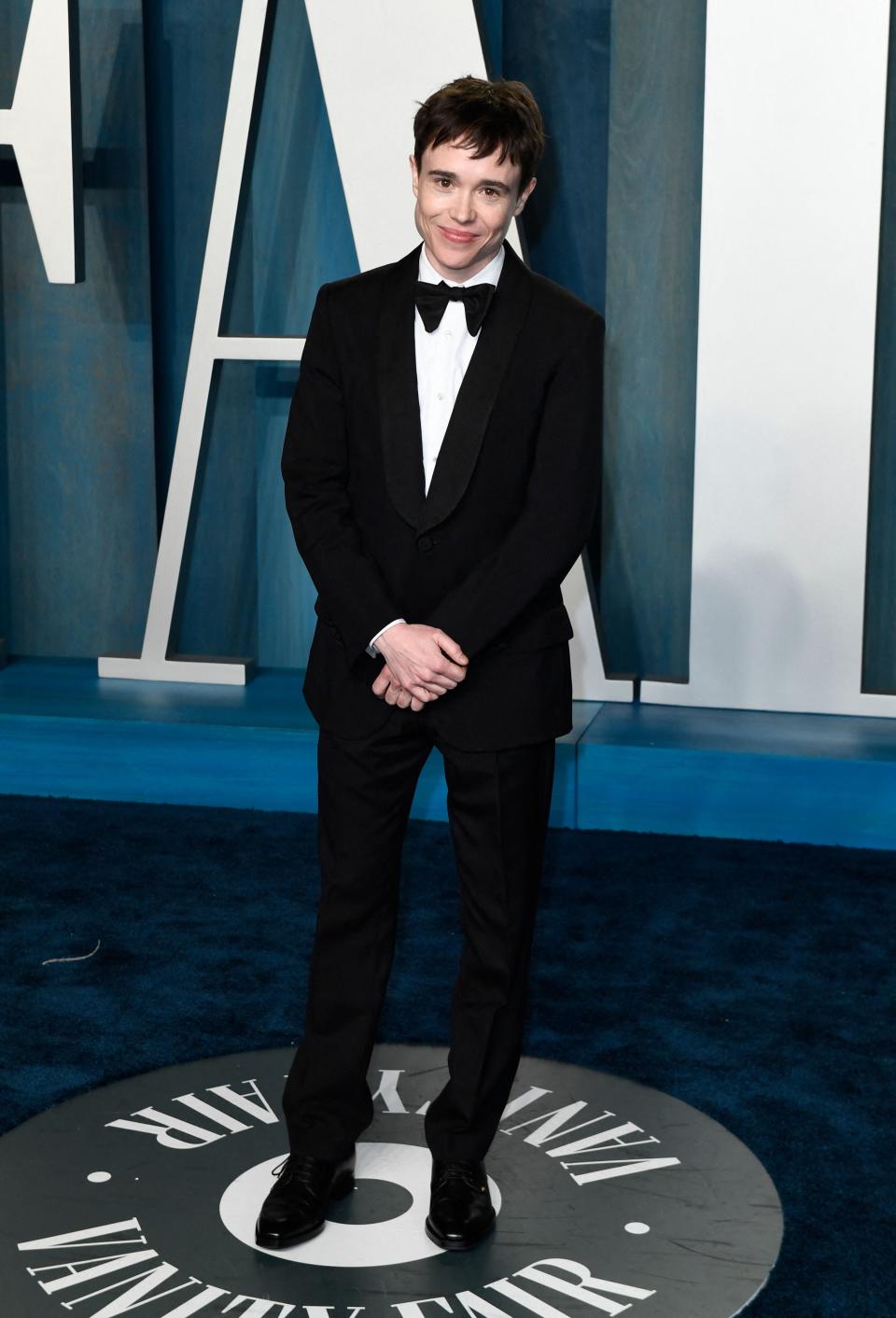Elliot Page details abuse, dysphoria, coming out in memoir ‘Pageboy’: ‘The closet was grueling’
- Oops!Something went wrong.Please try again later.
Elliot Page is done begging us to hear him. Now it’s time for everyone to listen.
“As a trans person and a public one, the sensation is that I’m always pleading for people to believe me,” Page writes in his new memoir, “Pageboy” (Flatiron, 288 pp., out now), a vulnerable, sometimes wrenching but ultimately hopeful account of his life so far. At only 36, he still has (hopefully) quite a way to go, now as his authentic self: trans and “happier than ever,” a vibe that radiates from the book’s cover on which Page, his tattooed arms hanging out of a tight white tank top, a chain dangling around his neck, looks confident in a suave James Dean slouch.
Such autonomy and self-actualization was hard won for Page. For decades, the Oscar-nominated star of the 2007 film “Juno” and Netflix’s “The Umbrella Academy” tried to fold himself to fit within a set of socially acceptable gendered parameters, wearing feminine clothing that chafed and trying to force romantic feelings for boys. Before he came out as a trans man in 2020, those parameters were closing in. “The closet was grueling, it suffocated me,” he writes.
More 'Pageboy' revelations: Elliot Page reveals past relationship with Kate Mara
“I know books have helped me, saved me even,” Page writes in his author’s note, “so perhaps this can help someone feel less alone, seen, no matter who they are or what journey they are on.”
Purchases you make through our links may earn us and our publishing partners a commission.
Here’s what we learned reading Page’s memoir, which is essential Pride Month reading:

Elliot Page suffered bullying and abuse, both as a child and adult
Page writes extensively of the bullying and abuse he suffered, as both a child and adult, often because of his queerness.
He was tormented in school, called homophobic slurs and shoved in the boys' bathroom. The slurs continued as he matured, often from strangers on the street. As he was walking down the street in Toronto while filming “The Umbrella Academy,” someone threw a beer at him. Page writes of another terrifying recent encounter, a walk to the convenience store that turned violent when he made eye contact with a man on the street who started screaming slurs at Page – and then started chasing him.
On a recent flight, Page was recognized by a priest and his curate as they looked for their seats on a plane. During the flight, the priest passed Page a note. He opened it, expected words of encouragement from a queer-friendly religious leader. Instead, the note read: “I took the liberty of googling you… Your soul is struggling. You need the arms of the Heavenly Father around you.”
One of the most shocking incidents occurred in 2014, just after Page came out as gay. At a party, an acquaintance Page describes as “one of the most famous actors in the world” showed up inebriated and began insulting him for coming out. “’That doesn’t exist. You aren’t gay. You are just afraid of men,” the actor said, threatening to have sex with Page to make him realize he wasn’t gay, describing in lurid detail what he was going to do to his body. Page locked himself in the bathroom to get away.
A few days later, Page encountered the actor again at the gym. “People are saying I need to apologize to you, but I don’t remember anything. I’m not like that at all, I’m not prejudiced. I don’t know why that happened. I’m sorry. I’m sorry I don’t remember anything,” the actor said.
Page does not name the actor.
20 summer books for poolside reading from Stephen King, Elliot Page, Elin Hilderbrand and more
How Hollywood groomed Elliot Page and kept him in the closet
It’s every actor’s dream: an Oscar-nominated role that catapults the actor to stardom.
But while Page’s lead acting nomination for “Juno” led to more roles, they came at a price.
“The success of 'Juno' coincided with people in the industry telling me no one could know I was queer,” Page writes. “That it wouldn’t be good for me, that I should have options, that this was for the best. So I put on the dresses and the makeup. I did the photo shoots.”
Page writes of being made to wear a dress and heels to the “Juno” premiere. When he suggested a suit for the red carpet, Page writes that the film’s director called him personally, insisting Page play the part of a Hollywood starlet. He walked the red carpet in a dress and heels. (Jason Reitman directed "Juno," though Page doesn't cite him by name.)
“I was being told to lie and hide. It puzzled me to watch cis straight actors play queer and trans characters and be revered. Nominations, wins, people exclaiming, ‘How brave!’” Page writes. “Hollywood is built on leveraging queerness. Tucking it away when needed, pulling it out when beneficial, while patting themselves on the back. Hollywood doesn’t lead the way, it responds, it follows, slowly and far behind. The depth of that closet, the trove of secrets buried, indifferent to the consequences. I was punished for being queer while I watched others be protected and celebrated, who gleefully abused people in the wide open.”
Page himself was a victim of such abuse. He writes of a director he does not name who “groomed” him when he was a teenager, texting Page frequently and gifting him books. One night he took Page to dinner and stroked his thigh under the table. “You have to make the move, I can’t,” Page writes the director whispered.

Elliot Page out of the closet and thriving, with or without his dad
“Can I be a boy?” Page asked his mother when he was 6 years old. The answer was a crushing no.
Page writes of the pressure he felt growing up in Canada to “be a young lady, and make my mom proud.” His mother, the daughter of an Anglican minister was not initially accepting of Page’s queerness. When he was 15 and trying to come to terms with his attraction to women, he tried telling his mom he might be gay. “That doesn’t exist!” she yelled, according to Page, who buried the admission.
Page was often miserable in his body, engaging in self-harm, including cutting, and food restriction. “I dropped to eighty-four pounds. My arms were so skinny I could take the outer sleeve of a to-go coffee cup, stick my hand through and slide it up my arm, beyond my elbow and to my shoulder,” Elliot writes. “Wasting away.” He wore tighter and tighter sports bras trying to flatten his breasts, unable to shower or change his clothes.
It wasn’t until around his 30th birthday, Page writes, that he acknowledged “in the properly conscious sense” that he was trans for the first time, about four years before he came out publicly.
With time, Page’s mother has become an ally. “People can surprise you,” Page writes. “We’ve never been closer, and her willingness to change and grow and move through the discomfort has been powerful and inspiring. She’s become my ally. She loves her son endlessly. I’m lucky to have that, to feel such profound and genuine love. What was the most beautiful and meaningful was to watch her bloom as her old narratives and doctrines faded.”
His dad, however, Page hasn’t spoken to in five and a half years. Their relationship had always been strained after his parents divorced and his father remarried. But Page writes that after he came out, his father “liked” a tweet criticizing Page made by transphobic men’s rights activist Jordan Peterson.
“I have no clue what my father thinks of his son at this point, what he says, how he explains my absence,” Page writes. But he makes clear the rift is his father’s responsibility. “The world tells us that we aren’t trans but mentally ill. That I’m too ashamed to be a lesbian, that I mutilated my body, that I will always be a woman, comparing my body to Nazi experiments,” Page writes. “It is not trans people who suffer from a sickness, but the society that fosters such hate.”
This article originally appeared on USA TODAY: Elliot Page's 'Pageboy': What we learned reading the actor's memoir

